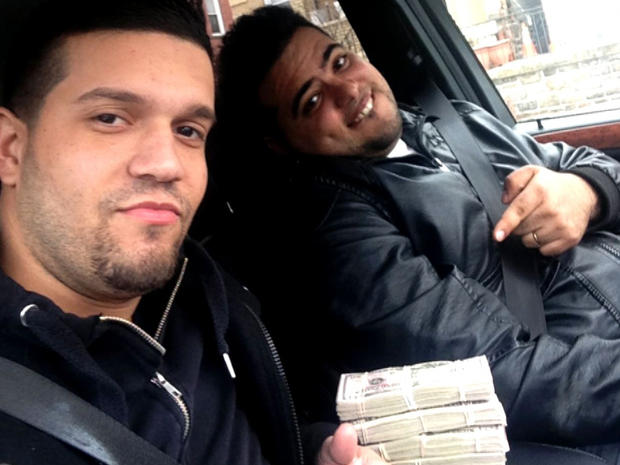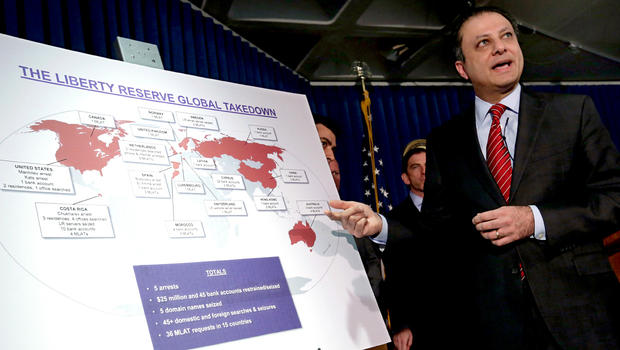Feds bust online currency firm in $6B money-laundering scheme
Updated 6:38 p.m. ET
NEW YORK Federal prosecutors have indicted the founder of an online currency transfer business, along with six other people, on charges they perpetrated a $6 billion money-laundering scheme.
Arthur Budovsky is the founder of Liberty Reserve, a Costa Rica-based website long favored by cybercrime scammers. He was arrested in Spain on Friday. A defendant identified as Budovsky's partner, Vladimir Kats, was in custody in New York.
"As alleged, the only liberty that Liberty Reserve gave many of its users was the freedom to commit crimes -- the coin of its realm was anonymity, and it became a popular hub for fraudsters, hackers and traffickers," said Preet Bharara, U.S. Attorney for the Southern District of New York, in a statement. "The global enforcement action we announce today is an important step towards reining in the 'Wild West' of illicit Internet banking."
"If Al Capone were alive today this is how he would hide his money," Richard Weber, who is leading the IRS investigation, said at a press conference.
Authorities say the network processed at least 55 million illegal transactions worldwide for 1 million users, including 200,000 in the United States. They call the international money-laundering case the largest ever.
"The scope of the defendants' unlawful conduct is staggering,'' said an indictment unsealed in federal court in Manhattan.
CBS News correspondent Elaine Quijano reports stolen money from ATMs would be sent to money exchangers in countries with lax oversight, including Vietnam, Russia and Nigeria. The cash would be converted to credits deposited in a Liberty Reserve account. Those credits could pay other users or be cashed out. All users need to get started was an email address.
In a statement, Costa Rica police confirmed that Budovsky had been arrested in Spain on money-laundering charges and that several premises linked to his company had been raided. A notice pasted across Liberty Reserve's website last week said the domain "has been seized by the United States Global Illicit Financial Team.''
Liberty Reserve's demise is likely to send a sharp shock across the Internet.
The indictment calls the network "one of the principal means by which cyber criminals around the world distribute, store and launder proceeds of their illegal activity ... including credit card fraud, identity theft, investment fraud, computer hacking, child pornography and narcotics trafficking.''
Liberty Reserve allowed users to open accounts using fictitious names, including "Russian Hacker'' and "Hacker Account.'' The network charged a 1 percent fee on transactions.
"An undercover agent working as part of this group was able to register a name of 'Joe Bogus, the account name 'to steal everything,' and the address '123 Fake Main Street' in 'completely made up city USA,'" Bahara said, according to Quijano.
- In Bitcoin we cannot trust
- Bitcoin: What's the buzz about?
- Cyber-attacks behind possibly record-breaking bank heist
Budovsky and Katz have previous convictions on charges related to an unlicensed money-transmitting business, according to court papers. After that case, the pair decided to move their operation to Costa Rica, where Budovsky officially renounced his U.S. citizenship, the papers say.
In an online chat captured by law enforcement, Katz admitted Liberty Reserve was "illegal'' and noted that authorities in the United States knew it was "a money laundering operation that hackers use.''
Aditya Sood, a computer science doctoral candidate at Michigan State University who has studied the underground economy, described Liberty Reserve as a no-questions-asked alternative to the global banking system, with little more than a valid e-mail needed to open an account and start moving money across borders.
"You don't need to provide your full details, or personal information, or things like that,'' Sood said in a telephone interview. "There's no way to trace an account. That's the beauty of the system.''
Liberty Reserve's ease of use and rock-bottom processing fees also attracted a thriving community of tech-savvy users in countries with limited access to credit cards, said Mitchell Rossetti, whose Houston-based ePayCards.com was one of several mainstream merchants that accepted the online-only currency.
Rossetti said his business still had about $28,000 tied up in Liberty Reserve accounts. Liberty Reserve's irreversible transactions made it attractive to small merchants worried about fraud.
"The irony of this is I went to them because of the security,'' Rossetti said. "All sales were final.''
He acknowledged that the currency was being used by scammers but said Liberty Reserve was just like any other currency. "The U.S. dollar can be donated to a church or it can pay a prostitute,'' he said.
Liberty Reserve appears to have played an important role in laundering the proceeds from the recent theft of some $45 million from two Middle Eastern banks, according to legal documents made public by U.S. authorities earlier this month.
"We are now entering the cyber age of money laundering," said Richard Weber, head of the IRS's criminal investigations unit, in a statement. "Technology advancements over the past several years have dramatically increased opportunities for criminals to move, conceal and enjoy their ill-gotten gains. Liberty Reserve and its principals have been charged with operating a sophisticated and complex system for structuring financial transactions which catered to those engaged in such criminal activity."
The complaint against one of the Dominican Republic gang members allegedly involved in the theft states that thousands of dollars' worth of stolen cash was deposited into two Liberty Reserve accounts via currency centers based in Siberia and Singapore.
The Costa Rica police statement said that they raided three homes and five businesses linked to Liberty Reserve and seized papers and digital documents that will be turned over to U.S. authorities.
Separately, the Manhattan District Attorney's office on Tuesday announced the extradition of Alfonso Portillo, the former president of Guatemala, to face charges he embezzled millions of dollars from the Guatemalan government and laundered the funds through U.S. bank accounts.

